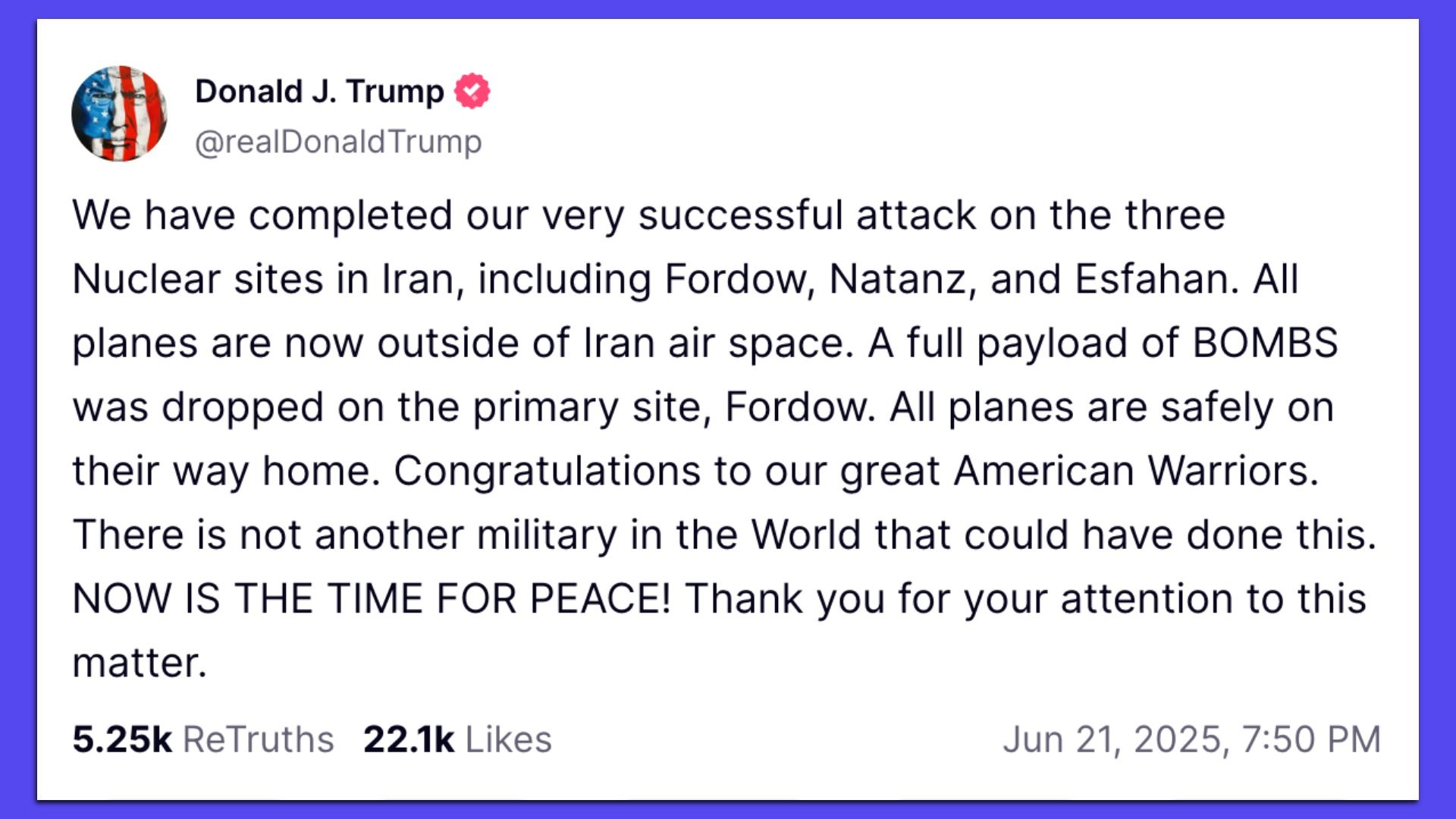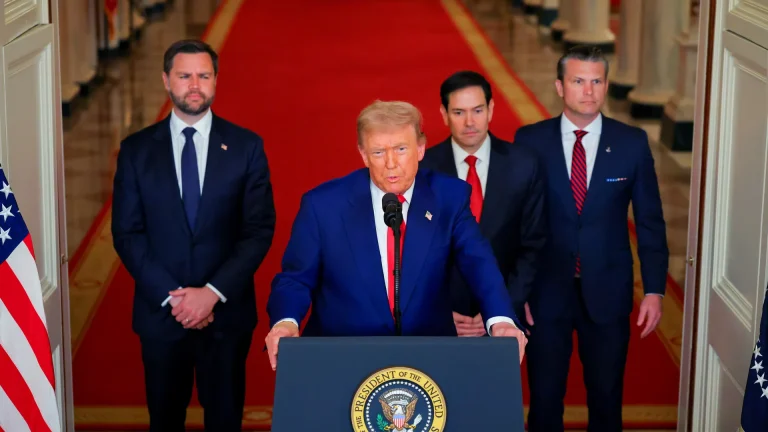The U.S. military conducted airstrikes on Iran‘s nuclear facilities in Fordow, Natanz and Isfahan on Sunday morning local time.
The latest: In a historic address from the White House, President Trump called the operation a “spectacular military success” and claimed Iran’s key uranium enrichment sites “have been completely and totally obliterated.”
- “Iran, the bully of the Middle East, must now make peace,” Trump said, flanked by Vice President Vance, Secretary of State Marco Rubio and Defense Secretary Pete Hegseth.
- “This cannot continue. There will be either peace or there will be tragedy for Iran far greater than we have witnessed over the last eight days,” Trump warned.
Why it matters: Trump’s decision to intervene directly in support of Israel’s effort to dismantle Iran’s nuclear program marks a historic escalation in the Middle East.
- It’s an intervention fraught with risks and uncertainty — one that Trump and many of his predecessors had sought to avoid, including through diplomacy with Iran.
- The attack, which came on the ninth night of the unprecedented war between Israel and Iran, could provoke retaliation from Tehran against U.S. troops and military installations across the region.
- Trump posted on Truth Social: “ANY RETALIATION BY IRAN AGAINST THE UNITED STATES OF AMERICA WILL BE MET WITH FORCE FAR GREATER THAN WHAT WAS WITNESSED TONIGHT.”
Driving the news: In his speech on Saturday night, Trump said the objective of the strikes was to destroy Iran’s nuclear enrichment capacity and halt the “nuclear threat posed by the No. 1 state sponsor of terror.”
- Trump thanked Israeli Prime Minister Benjamin Netanyahu: “We worked as a team like no team has ever worked before and we have gone a long way erasing this threat for Israel,” he said.
- Trump warned that the U.S. still has many targets left in Iran, and that the military will “take them out within minutes” if peace with the Islamic Republic “doesn’t come quickly.”
Behind the scenes: Trump met with his national security team in the White House Situation Room on Saturday evening.
- An Israeli official said the Trump administration notified Israel in advance of the U.S. strikes in Iran. A White House official told Axios Trump spoke to Netanyahu after the operation.
- Another senior Israeli official told Axios that B-2 stealth bombers were used for the strike.
The other side: The Iranian Atomic Energy Organization confirmed the three nuclear sites were attacked and condemned “the American enemy” for a “brutal act that contradicts international laws.”
- The organization said that “despite the evil conspiracies of its enemies,” Iran would not be deterred from continuing to develop its national nuclear energy industry.

What they’re saying: “For 40 years, Iran has been saying ‘Death to America,’ ‘Death to Israel.’ They have been killing our people, blowing off their arms, blowing off their legs with roadside bombs,” Trump said in his speech.
- “Hundreds of thousands throughout the Middle East and around the world have died as a direct result of their hate. In particular, so many were killed by their general, Qasem Soleimani,” he continued, referring to the Iranian military leader whose assassination he ordered in his first term.
- “I decided a long time ago that I would not let this happen. It will not continue,” Trump said.
Netanyahu said in a video released in English: “President Trump and I often say: ‘Peace through strength. ‘First comes strength, then comes peace. And tonight, President Trump and the United States acted with a lot of strength.”
Driving the news: In the days leading up to the strike, Trump and his team became increasingly convinced that diplomacy had run its course — and that military action would be necessary to eliminate Iran’s nuclear program.
- The president publicly announced on Thursday that he would make a decision “in the next two weeks” to give Iran a final chance to negotiate, but preparations for a strike accelerated over the weekend.
- Multiple B-2 stealth bombers — capable of carrying 30,000-pound “bunker-busters” — were detected heading west across the Pacific on Saturday, as speculation mounted that the U.S. would strike Fordow.
- Trump had publicly questioned Israel’s capacity to take out the underground facility on its own, saying Friday, “They can break through a little section, but they can’t go down very deep.”
Behind the scenes: Trump, whose “America First” base has been deeply divided on whether to join Israel’s war, has remained steadfast in one position: Iran must never be allowed to obtain a nuclear weapon.
- He made a last-ditch push to avoid U.S. intervention last week, exploring a backchannel meeting with Iranian officials in Istanbul, brokered by Turkish President Recep Tayyip Erdoğan.
- Trump was willing to send White House envoy Steve Witkoff and Vice President Vance — or even attend the talks himself if necessary.
- But the effort collapsed when Iran’s Supreme Leader Ali Khamenei, who was in hiding over fears of Israeli assassination, couldn’t be reached to authorize the meeting.
Since then, Iran has refused to engage directly with the U.S. unless Israel halts its attacks. Trump, now convinced no deal is possible, appears to have moved ahead with the military option he once hoped to avoid.



